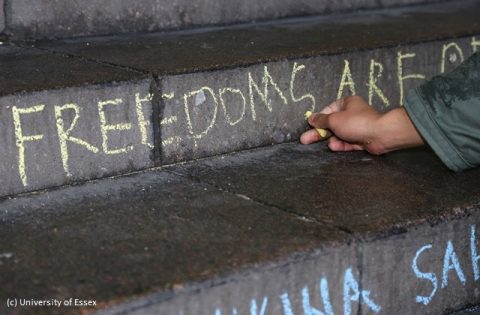Opinion: Populism and Universal Human Rights
May 17, 2017
 IMADR Director, Theo van Boven, shares his in-depth analysis on threats of the current rise of populism to an inclusive social and international order and the principles of human rights.
IMADR Director, Theo van Boven, shares his in-depth analysis on threats of the current rise of populism to an inclusive social and international order and the principles of human rights.
– – – – –
- Trends and Developments
In Europe, the United States of America and elsewhere in the world there is a notable trend in political and social mentality that turns away from an inclusive society. It alienates itself from the opening preambular paragraph of the Universal Declaration of Human Rights which recognizes “the inherent integrity and the equal and inalienable rights of all members of the human family as the foundation of freedom, justice and peace in the world”.
After the remarkable events leading to the collapse of the Berlin Wall in 1989, marking the end of the Cold War and opening up new modalities of international cooperation through the design of agendas for peace and development, the Vienna World Conference on Human Rights (1993) stated solemnly that the universal nature of human rights and fundamental freedoms is beyond question and reaffirmed the right of all peoples to self-determination. In Vienna due attention was given to the interdependence and the mutually reinforcing nature of democracy, development and respect for human rights and fundamental freedoms. It appeared at that time after the fall of the Berlin Wall that the era of walls, fences and narrow gateways was belonging to the past and that open borders were the prospect of the future. So it was at least envisioned in the framework of the European Communities (later European Union), based on the free circulation of persons, services and commodities. However, a major setback occurred on 11 September 2001 (9/11) with the terrorist attacks against the twin towers in New York and the Ministry of Defense in Washington DC leading to the self-proclaimed “war on terror” as the highest priority. This so-called war had serious erosive effects on human rights, notably by the use of methods breaching the absolute prohibition of torture, irrespective borders and without limits.
It was already prior to the dramatic events of 9/11 that Samuel Huntington launched his hypothesis of a clash of civilizations that people’s adverse cultural and religious identities will be the primary source of conflict. It raised the question whether “West versus the Rest” would be the watchword of the future. In fact, in present days of rising populism new barriers and new walls are designed or actually constructed, so as to close for instance borders between the USA and Mexico and fencing off the State of Israel and the Occupied Palestinian Territories. Similar constructions are being erected in the Balkans and in Central and Southern Europe to halt refugees from Syria, Sudan and Ethiopia and migrants from other African countries who seek protection, safety and well-being in affluent parts of Europe. Now that “other persons” with their own distinct race, religion, descent, ethnic and national origin seek access to Europe, often risking their lives and exploited by criminal smugglers, basic normative human rights and humanitarian law instruments turn into or remain a dead letter.
The “other persons”, if at all they manage to reach and stay in an affluent Europe, are in many ways facing xenophobic and overly patriotic attitudes of ethnic nationalism by partisans of a populist kind and their adherents who serve themselves with “alternative” information and half-truths. They do not hesitate to denounce the “others” as a potential or actual threat to national identity and therefore deserve to be treated as outsiders or even outcasts. We are currently facing a political and social climate in Europe where political leaders of the far right, among others Mr. Wilders (the Netherlands), Madame Le Pen (France), Mr. Farage (UK), Frau Petry (Germany), Mr. Hofer (Austria), are waving the same xenophobic flag and spreading the same racist message of “Our Own People First”. Mr. Trump’s “America First” is the very proto-type of the same kind which, if not counter-balanced by the prevalence of the rule of law and respect for human dignity and equality, would pose a major menace to an all-inclusive social and international order in which the rights and freedoms set forth in the Universal Declaration can be fully realized (Article 28 UDHR).
- Inclusion and Exclusion
“Inclusion” and “Exclusion” are key concepts in assessing the defiance of present-day populism. …Read the full article ![]()
Related Content

Newsletter E-CONNECT No.40 is out

Newsletter E-CONNECT No.39 is out

Newsletter E-CONNECT No.38 is out


